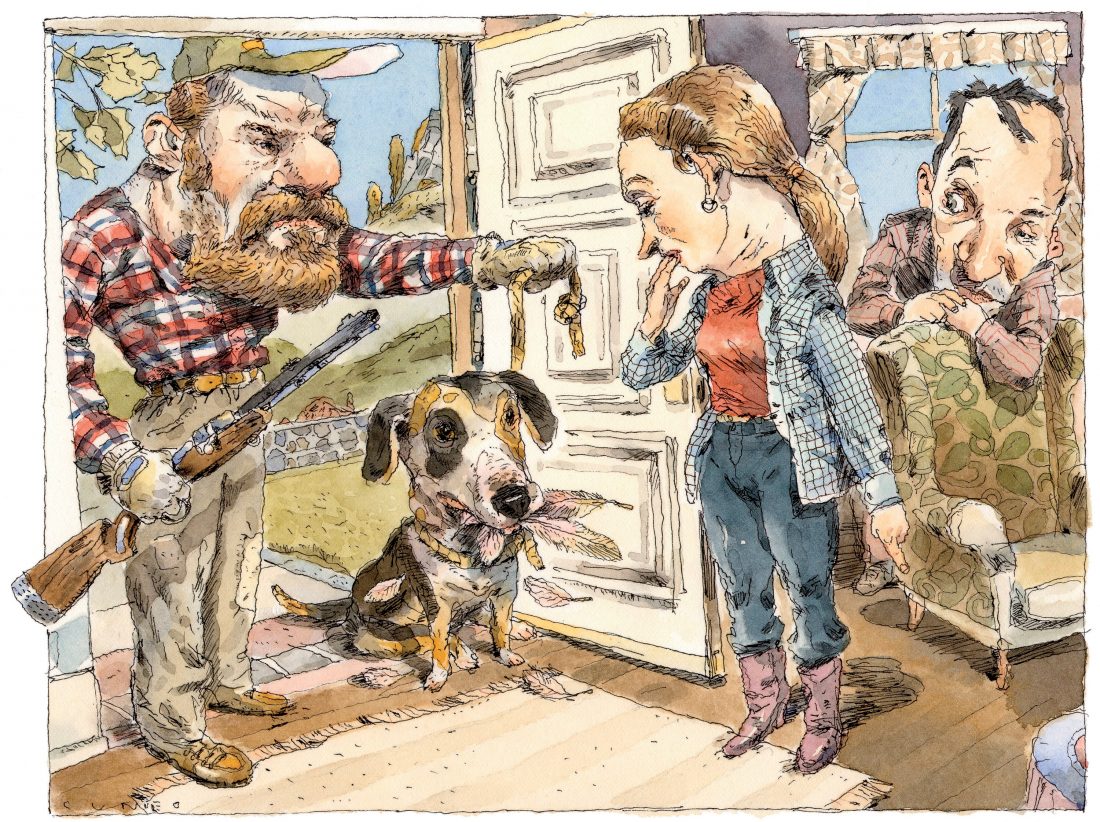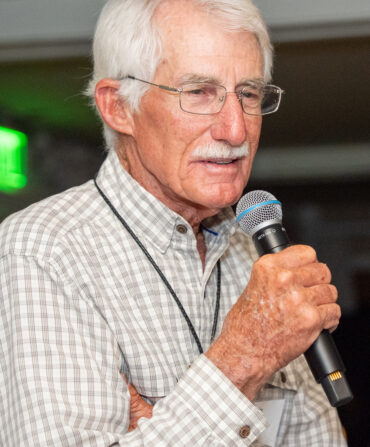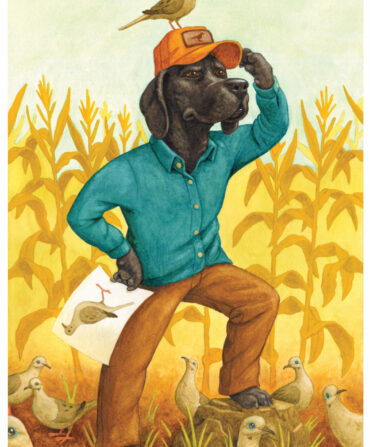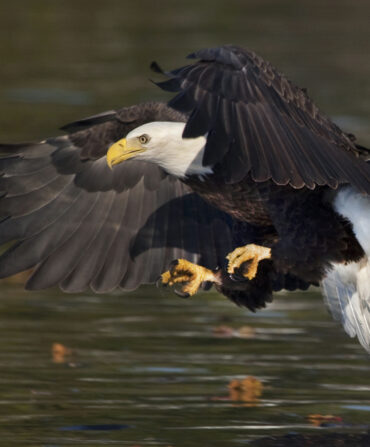The dog made us do it. Under a blazing September sun in front of two hundred friends and relatives, my husband and I got married in our backyard on the rural outskirts of Salem, Virginia. Scooter, our beagle-collie mutt, had set us on the matrimonial course. But even a country dog had the sense to get in the shade in the 98-degree heat—beneath the caterer’s pig smoker.
Scooter had a knack for jamming himself into the juiciest of spots. He’d first shown up scrounging for table scraps during a backyard party the year before. We learned later that he belonged to the family across the street.
But they didn’t pay much attention to him, judging from the ticks my husband pulled from his ears, the way he ran loose throughout the little mountain holler, and his unquenchable appetite. He was always nudging himself under the picnic table or next to the grill.
Getting a dog had been our whole reason for moving in together. Too dense to admit we were falling in love, Tom and I decided that since we both wanted a dog, we should just rent a place together and get one. We found a funky brick ranch at the base of Fort Lewis Mountain with so much land that it took three days to mow the lawn. It had stone retainer walls and a root cellar that was cloaked in poison ivy, which meant that before long we were too.
Having grown up city kids, we were new to this country enclave, full of shotguns and wall-mounted deer, cars on blocks and roaming, average-looking chickens—back then no one gave a thought to raising Rhode Island Reds. We tried to run over a copperhead in our driveway once with a Volkswagen Jetta, instead of just hitting it with a hoe, if that tells you anything.
The road was named Texas Hollow, but locals have long referred to our section of the county as West of the Brickyard, a nod to the brick factory near Salem’s western edge. When I told a native-born coworker we were getting hitched, he said we had it all backward. “The only marriage recognized West of the Brickyard is common law.”
Scooter was part and parcel of the WOTB landscape, an almost-stray who wandered loose, his right rear leg jutting out when he ran—from the time he got too close to a hot rod roaring down the street. And he was a master cuddler.
Then the For Sale sign went up in the neighbors’ front yard. I was crushed. We’d been trying for months to domesticate Scooter, extracting the ticks, letting him sleep in our house. He had become a shared hound, and, though we hadn’t spoken of the arrangement with the neighbors, they had three other dogs and didn’t seem to mind. By the time I sent my husband over to ask if we could take the dog off their hands when they moved, they nodded yeah, sure, and that was that. You might want to get him a rabies shot, they said, and we did.
They called him Bear, which must have been ironic, because he was the friendliest, easiest-going dog in the world. Didn’t make a mess, didn’t shed. And he seemed invincible, never once requiring a sick visit to the vet. He once consumed a giant chocolate bar I’d inadvertently left out on the coffee table, foil and all, and didn’t puke.
We called Bear’s people the Bumpuses, after the neighbors in the movie A Christmas Story. And for a while everything was great. Scooter/Bear was back and forth between the two houses, double-dipping on food. In preparation for becoming solo dog parents, we started taking him on walks, eliciting grins from the Bumpuses when we walked past with Scooter tugging madly on the leash.
A few weeks later, we came home from work and found the Bumpuses gone, their house emptied. They’d left no note, no forwarding address. No Bear. When the new neighbors moved in, we asked where the old ones had gone. They moved into town, they told us, on Bowman Avenue.
My husband looked at me, my eyes already ablaze with a plan, and shook his head.
“No,” he said. “You can’t just steal somebody’s dog.”
“Why not?” I cried. “They already gave him to us!”
“Well, for one thing, they’ve got guns.”
I didn’t have an iPhone or a GPS device in 1992, so I did what any newspaper reporter would do. I scoured the Roanoke Valley map on our newsroom wall and made a plan. I’d leave work early, drive down the back alleys of Bowman Avenue, and peer into every backyard, praying I wouldn’t become a crime brief in my own newspaper.
Minutes into the recon mission, I spotted moving boxes and knew the fluffy mottled tail had to be close. The dogs were all there, inside a chain-link fence. It was late afternoon, so the Bumpuses were probably at work.
I looked around to see if the neighbors were watching. They weren’t.
In my memory, Bear became Scooter the moment he jumped into my loving arms and took his place in my passenger seat. Lucinda Williams could have written a song about us. I drove four miles to our house in the country, across a river and a four-lane highway and, finally, down the meandering rural road that landed me and the wonder dog West of the Brickyard gloriously home.
It was two weeks before the doorbell rang. When my husband opened the door, Scooter shot out into the front yard. Mrs. Bumpus was standing there, shaking her head.
“We heard he found his way back,” she said.
“Yep, he just showed up,” my husband explained, which was not untrue.
She apologized for taking him without talking to us but said her husband had changed his mind as they were packing up. She reckoned if she took him now he’d probably just keep finding his way back again—across the river, the ravines, and the four-lane highway.
“Probably so,” my husband said, which was not untrue.
We had full possession of Scooter for fifteen years, through three houses and two kids; through the usual boredom and heartache, and the unusual bliss. Not only did he encourage the matrimonial leap, he also nudged us into buying our first house—thirty minutes away in Roanoke. It seemed he’d been helping himself to another neighbor’s chickens and, as that neighbor put it, “If I catch him again on my property, I’m going to drop him.”
But how did he know Scooter killed the chickens and not some other dog? I asked.
“Saw him with feathers in his mouth.”
We called a real-estate agent the next day.
So the country dog became a city dog and, before too long, a big brother too. Scooter accompanied my husband on 3:00 a.m. walks when the baby got croup and cold air was prescribed. When the second boy came along, Scooter’s seat in the family hierarchy moved even farther to the back of the minivan, but he never complained.
He was a country dog who never learned to walk a mountain trail off-leash (without bolting), never lost his frenzied appetite even after he got fat. Six hours before he died, Scooter had his last supper. It was leftover take-out pizza, and he’d scored it by leaping atop our dining room table—at the age of sixteen. He even got the cheesy bits off the lid.
He had the decency to take his last labored breaths on a night when we’d been discussing whether or not to take him to the vet to put him out of his misery. He died at 3:00 a.m. while my husband slept on the couch, one hand in Scooter’s fur to calm him as he panted.
Our latest rescue project is totally legit, I swear. Just before our firstborn left for college, he talked us into getting an SPCA puppy named Charley, a part Belgian Malinois resembling the Navy SEALS’ überdog, Cairo—the one who helped bring bin Laden down. It would take SEAL training to break this high-maintenance beast of his shoe chewing, and a host of other bad-puppy habits. Unlike our old WOTB pal, this dog requires obedience classes and $500 vet bills and—the damnedest thing of all—actual playdates with other dogs. Every time I see him splayed on our sofa with legs askew, I think of the Bumpuses, who would surely smile if they saw our fierce bin Laden hunter with his $60 haircut—and realize they’re getting the last laugh.
If Charley wasn’t microchipped, I might even find my way back to Bowman Avenue and leave them a replacement for the good dog that got away.








